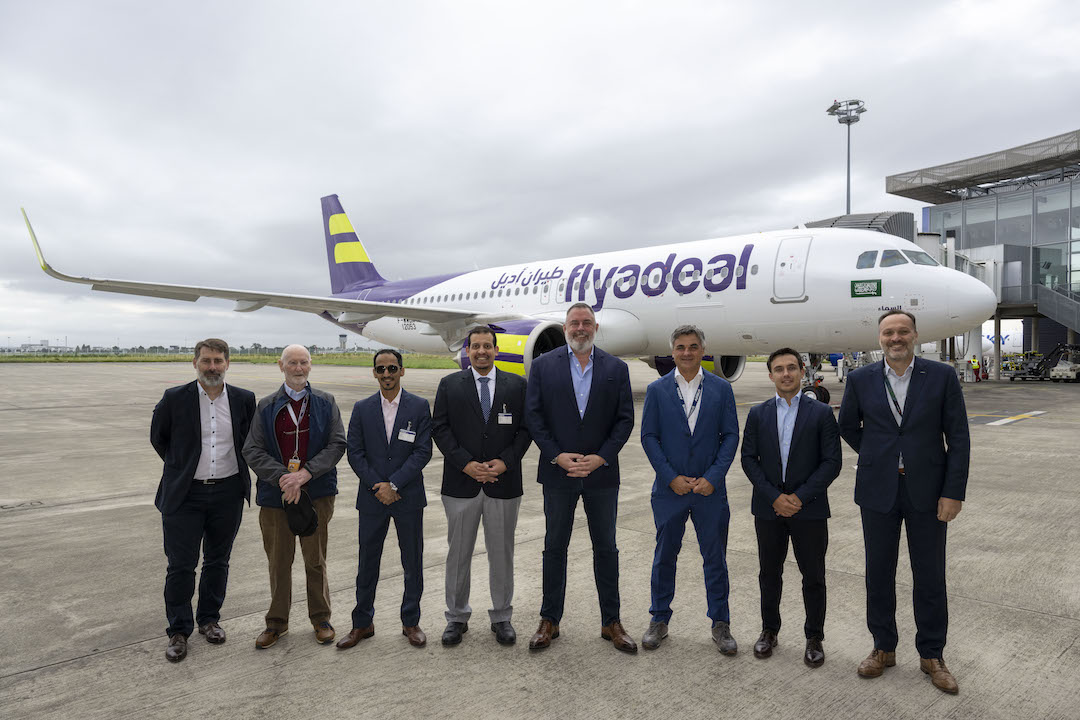Greenway tweaks Flyadeal’s growth plan
As it grows internationally, and moves to capture pilgrimage traffic, Saudi Arabian low-cost player Flyadeal is adapting its model.

New CEO Steven Greenway’s mission is to take Flyadeal to the next level. Image: Flyadeal
Preparation for its first widebody aircraft order, a revalidation of the network plan, expanding its distribution approach to traditional agency channels, plus moving into Hajj and Umrah flights, have all been part of Steven Greenway’s busy first six months at Flyadeal.
When he officially took the reins at Saudia Group’s LCC arm on January 1, Greenway, a 25-year veteran of the airline and travel business, found a carrier with a strong growth profile and an ambitious owner.
It is a clichéd phrase, acknowledged Greenway, but his mission is “to take Flyadeal to the next level,” he said, speaking to Arabian Aerospace on the sidelines of the IATA annual general meeting in Dubai in early June.
“Think of Flyadeal as a teenager. It's no longer an influencer, no longer a startup, but with 30-plus aircraft it’s not yet an airline of scale,” he explained. “The mission ahead of us with all the [order] announcements sees us grow from the 32 we have today to 100 within five years, net.”
Saudia unveiled an order for 105 Airbus A320neo family jets in late May, with 39 A321neos and 12 A320neos pencilled in for Flyadeal. Greenway talks about “net” fleet as it has extended the leases on its fleet of A320ceos to retain these types as the new Airbuses arrive and it has an existing delivery stream of 10 A320neos.
“So, we are effectively more than tripling in size in a very short time,” he said. To put that in perspective, Flyadeal will exceed in a decade what it took nearby flydubai 15 years to achieve, said Greenway.
“You don't see that type of accelerated growth anywhere else and to do that, to do it safely, to do it profitably, and to do it with all the constraints that are in the ecosystem, such as pilots, suppliers or the supply chain: It's a real challenge. That’s the mission.”
Flyadeal’s fleet boost is driven by an aggressive 10-year network plan that began with capitalising on the Kingdom’s sharp 10-15 per cent growth in domestic traffic since the pandemic. Today the carrier’s traffic is split 80:20 in favour of domestic.
There is plenty of headroom to sustain the domestic growth trajectory, however the aim is to reach traffic parity by 2030 as more international routes are launched, said Greenway.
His first task as CEO was the revalidation of the carrier’s network expansion ambitions, which were paused during Covid. That plan is solid, and it is resuming growth “at a clip”.
However, there will be changes, specifically “in the way we sell,” he stated.
This will see a move away from the “age-old formula of LCCs which is predominantly digital channels,” said Greenway. For a digital economy like Saudi Arabia this is fine, but as Flyadeal expands internationally “we must be more flexible in our sales and distribution approach.
“For example, if you are an Egyptian and you want to work in the Kingdom, I guarantee they don't have a credit card. So how can they transact with us?”
This new approach will see Flyadeal entering one of the global distribution systems, which Greenway will reveal soon, and it will become part of IATA’s billing and settlement plan to support sales via other channels including airlines. Full membership of IATA is therefore on the cards too.
“We will work with more third parties like online travel agencies and offline travel agencies, strengthen our GSA [general sales agent] network and introduce a holidays programme,” said Greenway, with the latter a reinvention of its online distribution strategy.
Much of this is a “classical” airline distribution approach, acknowledged Greenway, as the carrier seeks to expand its sales reach. “We accept that there are some inefficiencies and some cost issues around these things, and we just have to manage them properly.”

Acquiring further aircraft is important for Greenway, who has 88 either in the fleet or on order today. Over the coming six months he expects this number to go above 100 as his team secures new aircraft in what is a “heated market” with more orders or via lessors. This will address the carrier’s “fleet deficit” in the 2027-28 period.
From the time of the AGM to year-end, Flyadeal will take delivery of six A320neos.
Greenway is also picking up on the natural dynamics of the large Saudi market, where various cities feature high volumes and low yield and how to best serve this demand. “We are looking at long-haul in terms of [operating] widebodies,” he explained, pointing to his experience of the long-haul, low-cost airline concept at Singaporean carrier Scoot.
This is another shift from the traditional LCC model, but one the market opportunity may justify.
“It does not work everywhere, but we are considering how we can make it work, for example, worker traffic from south-east Asia and India, pilgrim traffic, and outbound traffic from the Kingdom to key destinations like London,” he said.
Flyadeal is evaluating this idea carefully, recognising the market conditions and operating model are key to success. The aim is to make a widebody fleet order by year-end with the likelihood of an order for at least 10 aircraft.
The carrier has been gaining experience with widebodies this summer as it conducts its Hajj flights using wet-leased Boeing 777s and A330s from various operators.
Building a Hajj programme is an important and new move for Flydeal, said Greenway. The carrier operated its first Hajj flights in 2023. “We have more than tripled in size this year where we have five dedicated leased widebody aircraft and we did over 200 flights and 30,000 pilgrims in the first month [May],” he noted.
“I intend to double this again next year,” he added, not just during the intense Hajj period, but the year-round Umrah pilgrimage. “Our focus is what we can do all year round in terms of offering a pilgrim product.” Pilgrim tours are organised through tour operators meaning this operation is somewhat “old school”, which Greenway applauds as it makes for good business.
Flyadeal will manage this flying with a combination of its own fleet, where Greenway plans to allocate around 10 per cent of its aircraft available for charters in what is effectively a “reserve” fleet, plus wet leases. Having more A320s available enables this move and ensure the resilience of its scheduled operation.
In terms of its network growth outside Saudi Arabia, Flyadeal will focus on the GCC countries. “Firstly, there are lot of countries, such as Kuwait, Bahrain, and Lebanon, which we haven’t even touched yet, so there are a lot of potential destinations,” said Greenway.
“Secondly, we will increase frequencies on routes that are performing well, such as Dubai. Beyond that its about moving into bringing worker traffic into the country, so sub-continent India and tourist traffic into south-east Europe. Africa is also a real interest area for us.”
Stay up to date
Subscribe to the free Times Aerospace newsletter and receive the latest content every week. We'll never share your email address.


